The Enduring Legacy of Florence Nightingale in Nursing: HLTEEN001
VerifiedAdded on 2023/06/09
|5
|1758
|108
Report
AI Summary
This report delves into the life and work of Florence Nightingale, the founder of modern nursing, with a specific focus on her Environmental Theory. It examines her biography, highlighting her pioneering role and contributions during the Crimean War. The paper meticulously outlines the tenets of the Environmental Theory, emphasizing the nurse's role in manipulating the patient's surroundings to facilitate recovery. It elucidates the theory's relevance to modern nursing practice, including its support for patient-centered care and application in clinical settings such as psychiatric care. Furthermore, the report discusses the theory's contribution to nursing research, drawing parallels with other theories like Peplau's Theory of Interpersonal Relations. The report also includes a reflection report that discusses the group assignment process, highlighting teamwork, collaboration, and personal learning experiences. The references used in the report are also included.
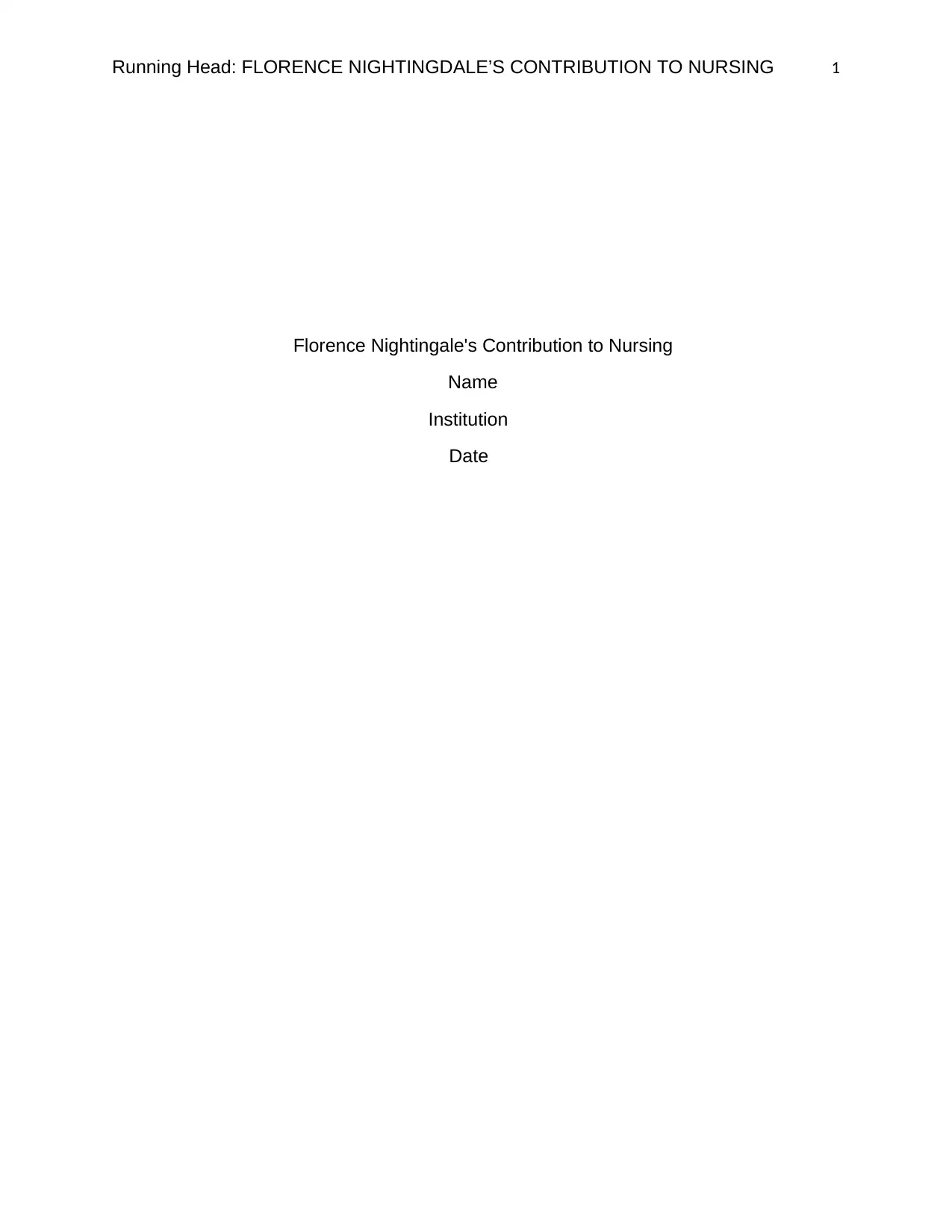
Running Head: FLORENCE NIGHTINGDALE’S CONTRIBUTION TO NURSING 1
Florence Nightingale's Contribution to Nursing
Name
Institution
Date
Florence Nightingale's Contribution to Nursing
Name
Institution
Date
Paraphrase This Document
Need a fresh take? Get an instant paraphrase of this document with our AI Paraphraser
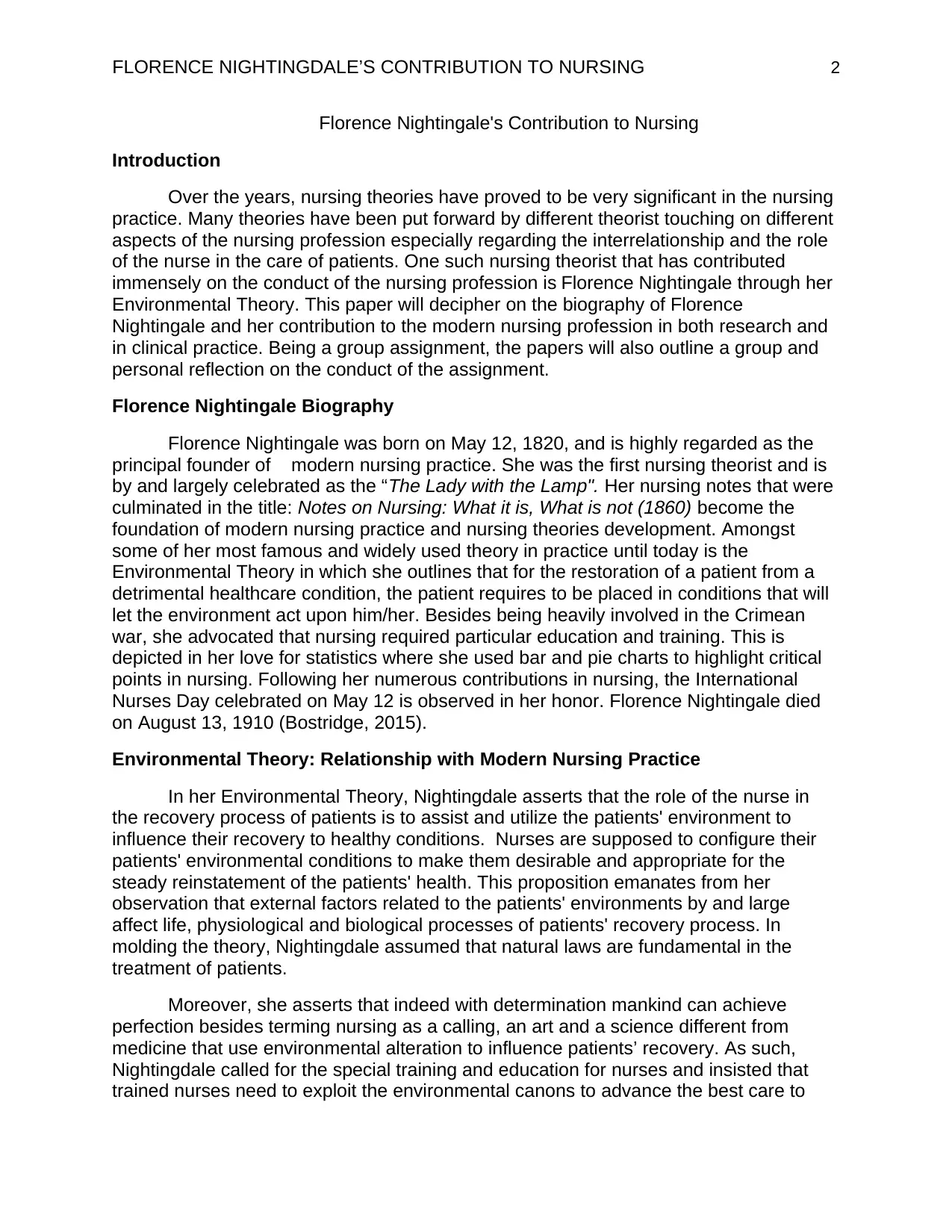
FLORENCE NIGHTINGDALE’S CONTRIBUTION TO NURSING 2
Florence Nightingale's Contribution to Nursing
Introduction
Over the years, nursing theories have proved to be very significant in the nursing
practice. Many theories have been put forward by different theorist touching on different
aspects of the nursing profession especially regarding the interrelationship and the role
of the nurse in the care of patients. One such nursing theorist that has contributed
immensely on the conduct of the nursing profession is Florence Nightingale through her
Environmental Theory. This paper will decipher on the biography of Florence
Nightingale and her contribution to the modern nursing profession in both research and
in clinical practice. Being a group assignment, the papers will also outline a group and
personal reflection on the conduct of the assignment.
Florence Nightingale Biography
Florence Nightingale was born on May 12, 1820, and is highly regarded as the
principal founder of modern nursing practice. She was the first nursing theorist and is
by and largely celebrated as the “The Lady with the Lamp". Her nursing notes that were
culminated in the title: Notes on Nursing: What it is, What is not (1860) become the
foundation of modern nursing practice and nursing theories development. Amongst
some of her most famous and widely used theory in practice until today is the
Environmental Theory in which she outlines that for the restoration of a patient from a
detrimental healthcare condition, the patient requires to be placed in conditions that will
let the environment act upon him/her. Besides being heavily involved in the Crimean
war, she advocated that nursing required particular education and training. This is
depicted in her love for statistics where she used bar and pie charts to highlight critical
points in nursing. Following her numerous contributions in nursing, the International
Nurses Day celebrated on May 12 is observed in her honor. Florence Nightingale died
on August 13, 1910 (Bostridge, 2015).
Environmental Theory: Relationship with Modern Nursing Practice
In her Environmental Theory, Nightingdale asserts that the role of the nurse in
the recovery process of patients is to assist and utilize the patients' environment to
influence their recovery to healthy conditions. Nurses are supposed to configure their
patients' environmental conditions to make them desirable and appropriate for the
steady reinstatement of the patients' health. This proposition emanates from her
observation that external factors related to the patients' environments by and large
affect life, physiological and biological processes of patients' recovery process. In
molding the theory, Nightingdale assumed that natural laws are fundamental in the
treatment of patients.
Moreover, she asserts that indeed with determination mankind can achieve
perfection besides terming nursing as a calling, an art and a science different from
medicine that use environmental alteration to influence patients’ recovery. As such,
Nightingdale called for the special training and education for nurses and insisted that
trained nurses need to exploit the environmental canons to advance the best care to
Florence Nightingale's Contribution to Nursing
Introduction
Over the years, nursing theories have proved to be very significant in the nursing
practice. Many theories have been put forward by different theorist touching on different
aspects of the nursing profession especially regarding the interrelationship and the role
of the nurse in the care of patients. One such nursing theorist that has contributed
immensely on the conduct of the nursing profession is Florence Nightingale through her
Environmental Theory. This paper will decipher on the biography of Florence
Nightingale and her contribution to the modern nursing profession in both research and
in clinical practice. Being a group assignment, the papers will also outline a group and
personal reflection on the conduct of the assignment.
Florence Nightingale Biography
Florence Nightingale was born on May 12, 1820, and is highly regarded as the
principal founder of modern nursing practice. She was the first nursing theorist and is
by and largely celebrated as the “The Lady with the Lamp". Her nursing notes that were
culminated in the title: Notes on Nursing: What it is, What is not (1860) become the
foundation of modern nursing practice and nursing theories development. Amongst
some of her most famous and widely used theory in practice until today is the
Environmental Theory in which she outlines that for the restoration of a patient from a
detrimental healthcare condition, the patient requires to be placed in conditions that will
let the environment act upon him/her. Besides being heavily involved in the Crimean
war, she advocated that nursing required particular education and training. This is
depicted in her love for statistics where she used bar and pie charts to highlight critical
points in nursing. Following her numerous contributions in nursing, the International
Nurses Day celebrated on May 12 is observed in her honor. Florence Nightingale died
on August 13, 1910 (Bostridge, 2015).
Environmental Theory: Relationship with Modern Nursing Practice
In her Environmental Theory, Nightingdale asserts that the role of the nurse in
the recovery process of patients is to assist and utilize the patients' environment to
influence their recovery to healthy conditions. Nurses are supposed to configure their
patients' environmental conditions to make them desirable and appropriate for the
steady reinstatement of the patients' health. This proposition emanates from her
observation that external factors related to the patients' environments by and large
affect life, physiological and biological processes of patients' recovery process. In
molding the theory, Nightingdale assumed that natural laws are fundamental in the
treatment of patients.
Moreover, she asserts that indeed with determination mankind can achieve
perfection besides terming nursing as a calling, an art and a science different from
medicine that use environmental alteration to influence patients’ recovery. As such,
Nightingdale called for the special training and education for nurses and insisted that
trained nurses need to exploit the environmental canons to advance the best care to
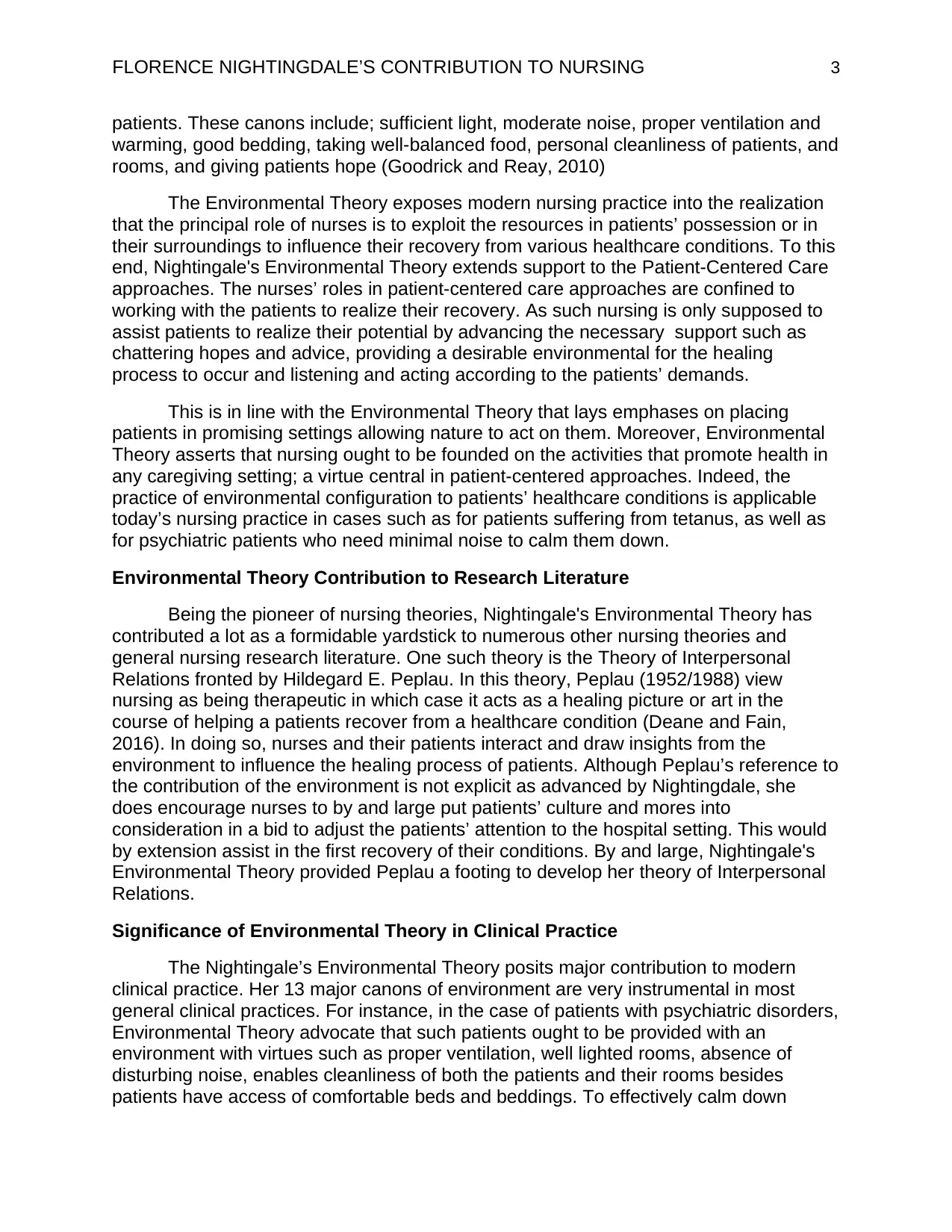
FLORENCE NIGHTINGDALE’S CONTRIBUTION TO NURSING 3
patients. These canons include; sufficient light, moderate noise, proper ventilation and
warming, good bedding, taking well-balanced food, personal cleanliness of patients, and
rooms, and giving patients hope (Goodrick and Reay, 2010)
The Environmental Theory exposes modern nursing practice into the realization
that the principal role of nurses is to exploit the resources in patients’ possession or in
their surroundings to influence their recovery from various healthcare conditions. To this
end, Nightingale's Environmental Theory extends support to the Patient-Centered Care
approaches. The nurses’ roles in patient-centered care approaches are confined to
working with the patients to realize their recovery. As such nursing is only supposed to
assist patients to realize their potential by advancing the necessary support such as
chattering hopes and advice, providing a desirable environmental for the healing
process to occur and listening and acting according to the patients’ demands.
This is in line with the Environmental Theory that lays emphases on placing
patients in promising settings allowing nature to act on them. Moreover, Environmental
Theory asserts that nursing ought to be founded on the activities that promote health in
any caregiving setting; a virtue central in patient-centered approaches. Indeed, the
practice of environmental configuration to patients’ healthcare conditions is applicable
today’s nursing practice in cases such as for patients suffering from tetanus, as well as
for psychiatric patients who need minimal noise to calm them down.
Environmental Theory Contribution to Research Literature
Being the pioneer of nursing theories, Nightingale's Environmental Theory has
contributed a lot as a formidable yardstick to numerous other nursing theories and
general nursing research literature. One such theory is the Theory of Interpersonal
Relations fronted by Hildegard E. Peplau. In this theory, Peplau (1952/1988) view
nursing as being therapeutic in which case it acts as a healing picture or art in the
course of helping a patients recover from a healthcare condition (Deane and Fain,
2016). In doing so, nurses and their patients interact and draw insights from the
environment to influence the healing process of patients. Although Peplau’s reference to
the contribution of the environment is not explicit as advanced by Nightingdale, she
does encourage nurses to by and large put patients’ culture and mores into
consideration in a bid to adjust the patients’ attention to the hospital setting. This would
by extension assist in the first recovery of their conditions. By and large, Nightingale's
Environmental Theory provided Peplau a footing to develop her theory of Interpersonal
Relations.
Significance of Environmental Theory in Clinical Practice
The Nightingale’s Environmental Theory posits major contribution to modern
clinical practice. Her 13 major canons of environment are very instrumental in most
general clinical practices. For instance, in the case of patients with psychiatric disorders,
Environmental Theory advocate that such patients ought to be provided with an
environment with virtues such as proper ventilation, well lighted rooms, absence of
disturbing noise, enables cleanliness of both the patients and their rooms besides
patients have access of comfortable beds and beddings. To effectively calm down
patients. These canons include; sufficient light, moderate noise, proper ventilation and
warming, good bedding, taking well-balanced food, personal cleanliness of patients, and
rooms, and giving patients hope (Goodrick and Reay, 2010)
The Environmental Theory exposes modern nursing practice into the realization
that the principal role of nurses is to exploit the resources in patients’ possession or in
their surroundings to influence their recovery from various healthcare conditions. To this
end, Nightingale's Environmental Theory extends support to the Patient-Centered Care
approaches. The nurses’ roles in patient-centered care approaches are confined to
working with the patients to realize their recovery. As such nursing is only supposed to
assist patients to realize their potential by advancing the necessary support such as
chattering hopes and advice, providing a desirable environmental for the healing
process to occur and listening and acting according to the patients’ demands.
This is in line with the Environmental Theory that lays emphases on placing
patients in promising settings allowing nature to act on them. Moreover, Environmental
Theory asserts that nursing ought to be founded on the activities that promote health in
any caregiving setting; a virtue central in patient-centered approaches. Indeed, the
practice of environmental configuration to patients’ healthcare conditions is applicable
today’s nursing practice in cases such as for patients suffering from tetanus, as well as
for psychiatric patients who need minimal noise to calm them down.
Environmental Theory Contribution to Research Literature
Being the pioneer of nursing theories, Nightingale's Environmental Theory has
contributed a lot as a formidable yardstick to numerous other nursing theories and
general nursing research literature. One such theory is the Theory of Interpersonal
Relations fronted by Hildegard E. Peplau. In this theory, Peplau (1952/1988) view
nursing as being therapeutic in which case it acts as a healing picture or art in the
course of helping a patients recover from a healthcare condition (Deane and Fain,
2016). In doing so, nurses and their patients interact and draw insights from the
environment to influence the healing process of patients. Although Peplau’s reference to
the contribution of the environment is not explicit as advanced by Nightingdale, she
does encourage nurses to by and large put patients’ culture and mores into
consideration in a bid to adjust the patients’ attention to the hospital setting. This would
by extension assist in the first recovery of their conditions. By and large, Nightingale's
Environmental Theory provided Peplau a footing to develop her theory of Interpersonal
Relations.
Significance of Environmental Theory in Clinical Practice
The Nightingale’s Environmental Theory posits major contribution to modern
clinical practice. Her 13 major canons of environment are very instrumental in most
general clinical practices. For instance, in the case of patients with psychiatric disorders,
Environmental Theory advocate that such patients ought to be provided with an
environment with virtues such as proper ventilation, well lighted rooms, absence of
disturbing noise, enables cleanliness of both the patients and their rooms besides
patients have access of comfortable beds and beddings. To effectively calm down
⊘ This is a preview!⊘
Do you want full access?
Subscribe today to unlock all pages.

Trusted by 1+ million students worldwide
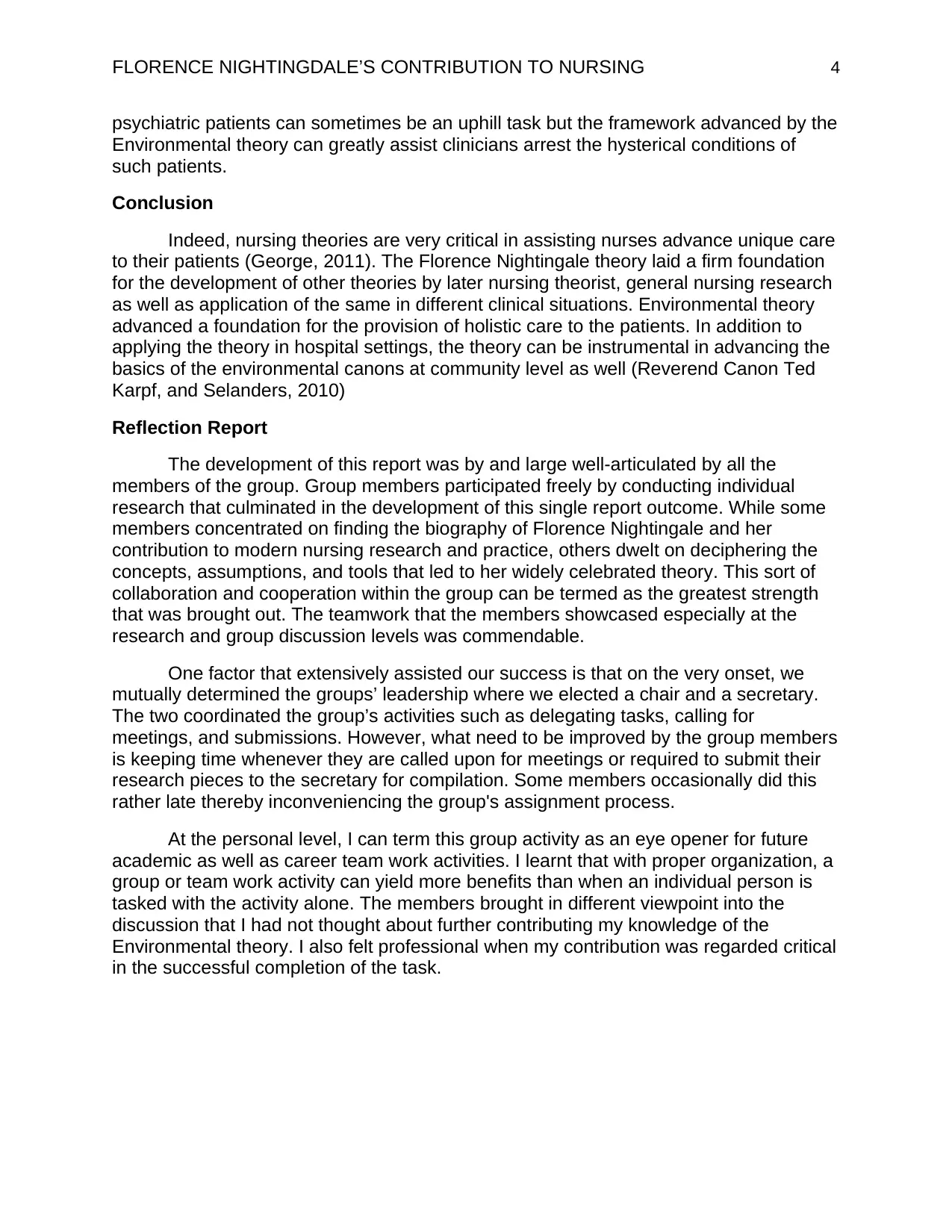
FLORENCE NIGHTINGDALE’S CONTRIBUTION TO NURSING 4
psychiatric patients can sometimes be an uphill task but the framework advanced by the
Environmental theory can greatly assist clinicians arrest the hysterical conditions of
such patients.
Conclusion
Indeed, nursing theories are very critical in assisting nurses advance unique care
to their patients (George, 2011). The Florence Nightingale theory laid a firm foundation
for the development of other theories by later nursing theorist, general nursing research
as well as application of the same in different clinical situations. Environmental theory
advanced a foundation for the provision of holistic care to the patients. In addition to
applying the theory in hospital settings, the theory can be instrumental in advancing the
basics of the environmental canons at community level as well (Reverend Canon Ted
Karpf, and Selanders, 2010)
Reflection Report
The development of this report was by and large well-articulated by all the
members of the group. Group members participated freely by conducting individual
research that culminated in the development of this single report outcome. While some
members concentrated on finding the biography of Florence Nightingale and her
contribution to modern nursing research and practice, others dwelt on deciphering the
concepts, assumptions, and tools that led to her widely celebrated theory. This sort of
collaboration and cooperation within the group can be termed as the greatest strength
that was brought out. The teamwork that the members showcased especially at the
research and group discussion levels was commendable.
One factor that extensively assisted our success is that on the very onset, we
mutually determined the groups’ leadership where we elected a chair and a secretary.
The two coordinated the group’s activities such as delegating tasks, calling for
meetings, and submissions. However, what need to be improved by the group members
is keeping time whenever they are called upon for meetings or required to submit their
research pieces to the secretary for compilation. Some members occasionally did this
rather late thereby inconveniencing the group's assignment process.
At the personal level, I can term this group activity as an eye opener for future
academic as well as career team work activities. I learnt that with proper organization, a
group or team work activity can yield more benefits than when an individual person is
tasked with the activity alone. The members brought in different viewpoint into the
discussion that I had not thought about further contributing my knowledge of the
Environmental theory. I also felt professional when my contribution was regarded critical
in the successful completion of the task.
psychiatric patients can sometimes be an uphill task but the framework advanced by the
Environmental theory can greatly assist clinicians arrest the hysterical conditions of
such patients.
Conclusion
Indeed, nursing theories are very critical in assisting nurses advance unique care
to their patients (George, 2011). The Florence Nightingale theory laid a firm foundation
for the development of other theories by later nursing theorist, general nursing research
as well as application of the same in different clinical situations. Environmental theory
advanced a foundation for the provision of holistic care to the patients. In addition to
applying the theory in hospital settings, the theory can be instrumental in advancing the
basics of the environmental canons at community level as well (Reverend Canon Ted
Karpf, and Selanders, 2010)
Reflection Report
The development of this report was by and large well-articulated by all the
members of the group. Group members participated freely by conducting individual
research that culminated in the development of this single report outcome. While some
members concentrated on finding the biography of Florence Nightingale and her
contribution to modern nursing research and practice, others dwelt on deciphering the
concepts, assumptions, and tools that led to her widely celebrated theory. This sort of
collaboration and cooperation within the group can be termed as the greatest strength
that was brought out. The teamwork that the members showcased especially at the
research and group discussion levels was commendable.
One factor that extensively assisted our success is that on the very onset, we
mutually determined the groups’ leadership where we elected a chair and a secretary.
The two coordinated the group’s activities such as delegating tasks, calling for
meetings, and submissions. However, what need to be improved by the group members
is keeping time whenever they are called upon for meetings or required to submit their
research pieces to the secretary for compilation. Some members occasionally did this
rather late thereby inconveniencing the group's assignment process.
At the personal level, I can term this group activity as an eye opener for future
academic as well as career team work activities. I learnt that with proper organization, a
group or team work activity can yield more benefits than when an individual person is
tasked with the activity alone. The members brought in different viewpoint into the
discussion that I had not thought about further contributing my knowledge of the
Environmental theory. I also felt professional when my contribution was regarded critical
in the successful completion of the task.
Paraphrase This Document
Need a fresh take? Get an instant paraphrase of this document with our AI Paraphraser
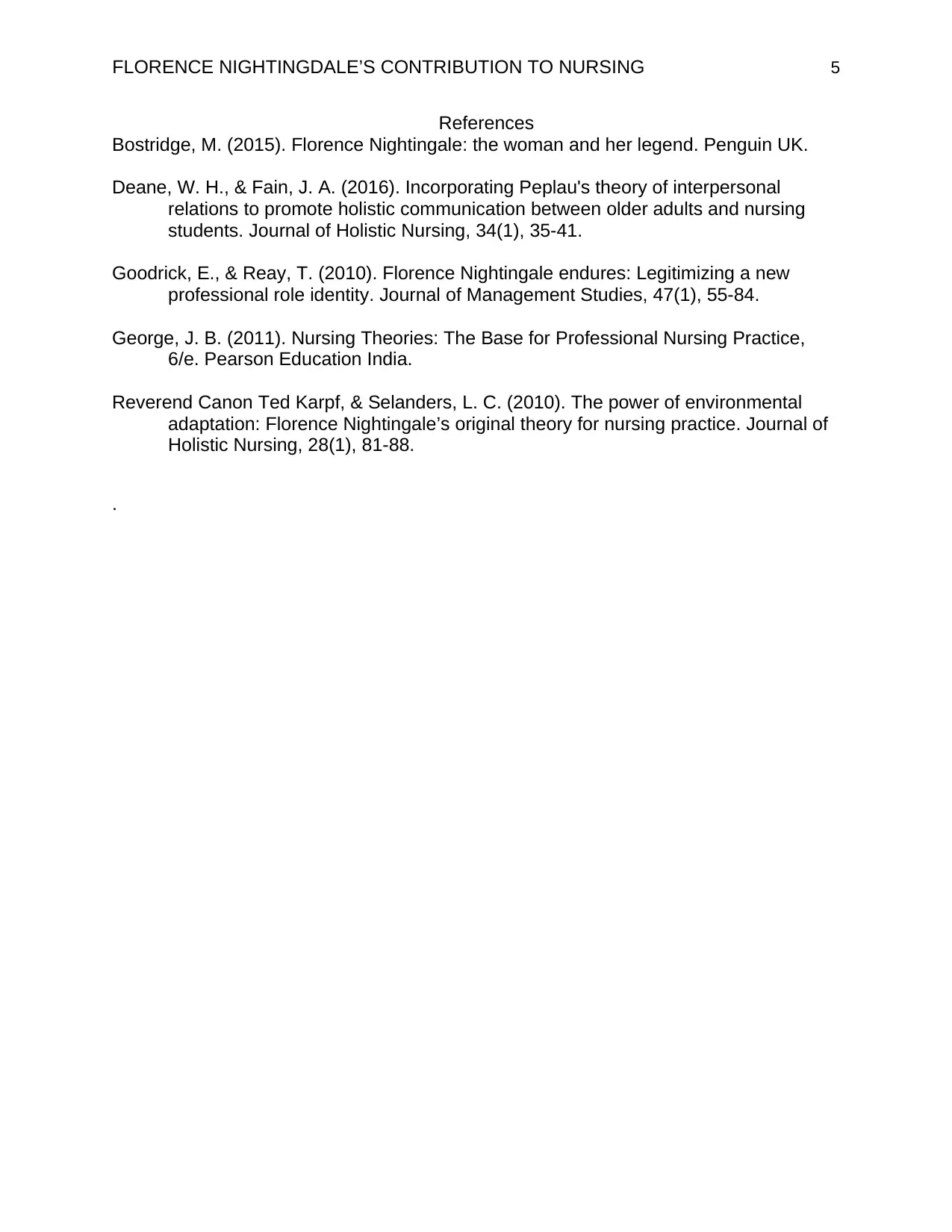
FLORENCE NIGHTINGDALE’S CONTRIBUTION TO NURSING 5
References
Bostridge, M. (2015). Florence Nightingale: the woman and her legend. Penguin UK.
Deane, W. H., & Fain, J. A. (2016). Incorporating Peplau's theory of interpersonal
relations to promote holistic communication between older adults and nursing
students. Journal of Holistic Nursing, 34(1), 35-41.
Goodrick, E., & Reay, T. (2010). Florence Nightingale endures: Legitimizing a new
professional role identity. Journal of Management Studies, 47(1), 55-84.
George, J. B. (2011). Nursing Theories: The Base for Professional Nursing Practice,
6/e. Pearson Education India.
Reverend Canon Ted Karpf, & Selanders, L. C. (2010). The power of environmental
adaptation: Florence Nightingale’s original theory for nursing practice. Journal of
Holistic Nursing, 28(1), 81-88.
.
References
Bostridge, M. (2015). Florence Nightingale: the woman and her legend. Penguin UK.
Deane, W. H., & Fain, J. A. (2016). Incorporating Peplau's theory of interpersonal
relations to promote holistic communication between older adults and nursing
students. Journal of Holistic Nursing, 34(1), 35-41.
Goodrick, E., & Reay, T. (2010). Florence Nightingale endures: Legitimizing a new
professional role identity. Journal of Management Studies, 47(1), 55-84.
George, J. B. (2011). Nursing Theories: The Base for Professional Nursing Practice,
6/e. Pearson Education India.
Reverend Canon Ted Karpf, & Selanders, L. C. (2010). The power of environmental
adaptation: Florence Nightingale’s original theory for nursing practice. Journal of
Holistic Nursing, 28(1), 81-88.
.
1 out of 5
Related Documents
Your All-in-One AI-Powered Toolkit for Academic Success.
+13062052269
info@desklib.com
Available 24*7 on WhatsApp / Email
![[object Object]](/_next/static/media/star-bottom.7253800d.svg)
Unlock your academic potential
Copyright © 2020–2026 A2Z Services. All Rights Reserved. Developed and managed by ZUCOL.





